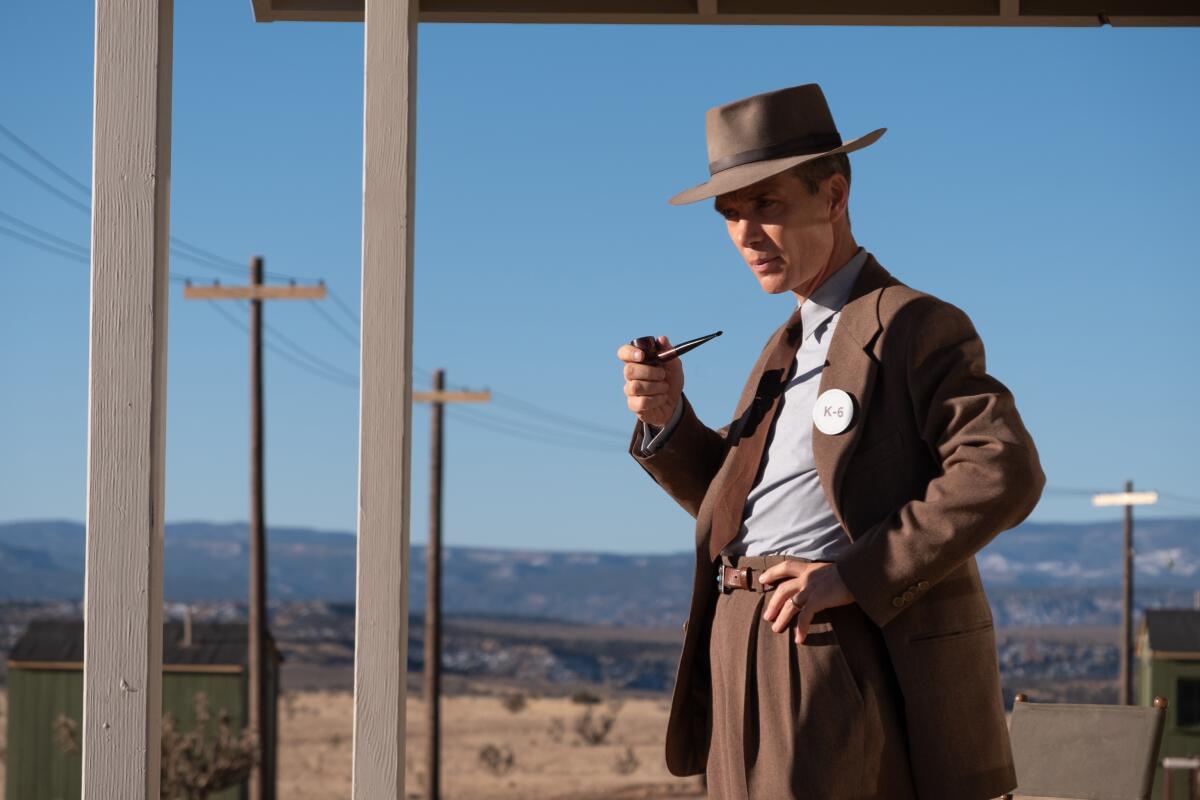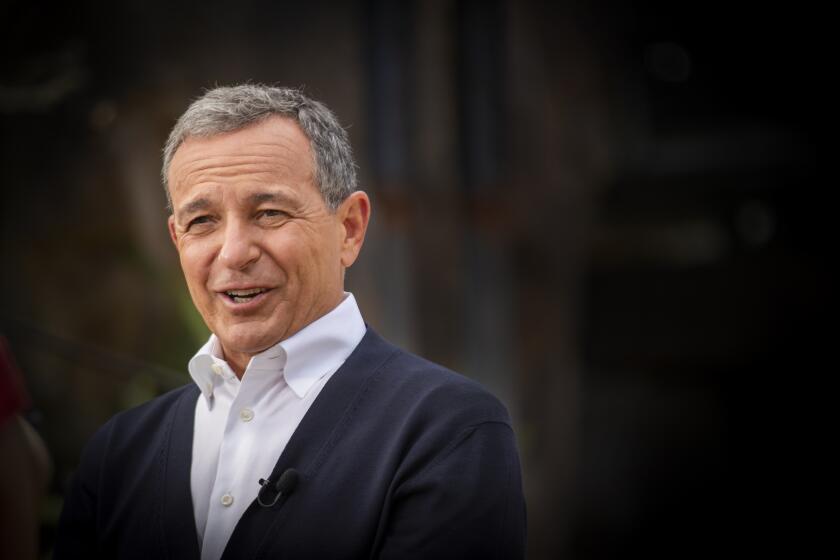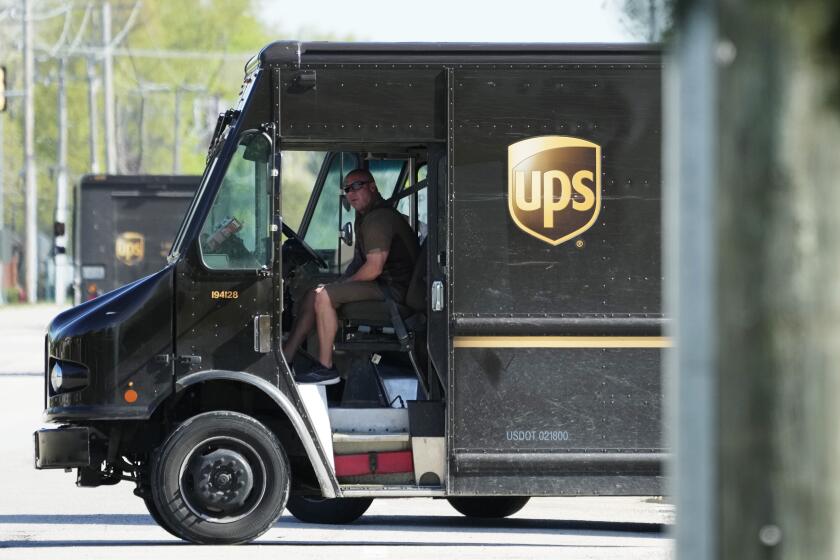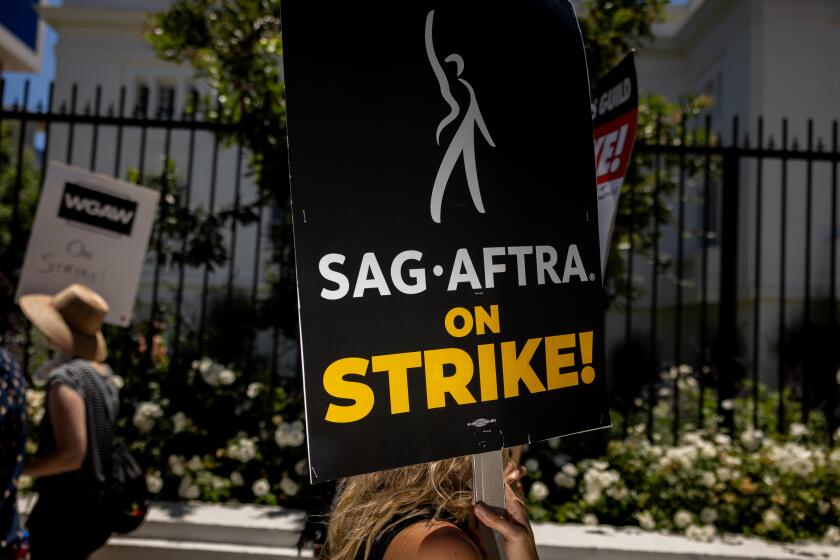What Hollywood studios should learn from the UPS-Teamsters deal

- Share via
When labor fights are conducted fairly, both sides have a feel for what’s at stake. Unions have to balance their members’ immediate and longer-term welfare, management is aware of the cost of work stoppage to its bottom line and the prospect of losing customers permanently.
The fights haven’t been fair since 1947, when Congress passed the ferociously anti-union Taft-Hartley Act over President Truman’s veto and employers started to feel free to treat unions as enemies to be destroyed.
The tentative settlement reached Tuesday between the Teamsters and United Parcel Service may serve as a reminder of what can be achieved on a more level — if not entirely level — playing field. Other employers, notably the Hollywood moguls trying to bluster their way through a strike by actors and writers and the management of fierce anti-union companies such as Starbucks, are well advised to pay attention.
Next year, there’s not going to be many programs for anybody to watch ... . You’re gonna see subscriptions get pulled, which is going to reduce the revenue of all these movie companies, television companies, the result of which is that there will be no programs.
— Former Hollywood studio boss Barry Diller
It’s perhaps too soon to draw many solid lessons from the UPS settlement, though both sides expressed satisfaction and relief at the outcome. The pact is subject to ratification by about 340,000 union members, a process expected to take three weeks.
“Together we reached a win-win-win agreement on the issues that are important to Teamsters leadership, our employees and to UPS and our customers,” UPS Chief Executive Carol Tomé said. Teamsters General President Sean O’Brien said, “We demanded the best contract in the history of UPS, and we got it. This contract sets a new standard in the labor movement and raises the bar for all workers.”
Get the latest from Michael Hiltzik
Commentary on economics and more from a Pulitzer Prize winner.
You may occasionally receive promotional content from the Los Angeles Times.
The new contract provides for a $7.50 an hour total pay increase over five years, including a $2.75 an hour raise this year. Part-time workers will get a raise to $21 an hour, fulfilling the union’s goal to take their pay higher than $20. The detested two-tier pay system affecting “22.4” workers — essentially full-time drivers who work into the weekend, will be eliminated. Those drivers will be reclassified as regular drivers.
UPS will equip delivery vehicles purchased after Jan. 1 with in-cab air conditioning, and all cars will get fans and air vents in the cargo compartments.
As I reported last month, both parties had something to lose and something to gain in the negotiations over a contract due to expire Monday. The company stood to lose $816 million if a strike lasted even 10 days, according to an estimate by the consulting firm Anderson Economic Group. Teamster members would lose $1.1 billion in wages, Anderson calculated, based on average annual pay of $90,000.
The broader economic impact from a strike would be massive — $7.1 billion in losses to industry and consumers. That might have prompted intensifying political pressure on both sides to reach a pact as the contract deadline approached, resulting in a deal that satisfied no one.
By any reasonable accounting, Hollywood’s top executives are grossly overpaid. But striking actors and screenwriters should understand it’s not just their industry where CEO pay is out of whack.
As negotiations dragged on, and especially if a strike occurred, other concerns would arise. Because some shippers dependent on UPS would be forced to turn to competitors such as FedEx, DHL and the U.S. Postal Service, UPS would reasonably become worried that it might never lure those customers back.
For the Teamsters, what hung in the balance was O’Brien’s reputation as a determined negotiator who had based his own election as general president on his resolve to obtain an industry-leading contract from UPS. O’Brien understands that union solidarity is the key to successful contract negotiations and successful strikes, but solidarity almost invariably wanes as strikes drag, especially if no visible progress is being made.
Even more important for the union movement at large, successful bargaining is the best advertisement for union membership. That lesson was delivered by the Teamsters’ last UPS strike, in 1997.
“You could make a million house calls, run a thousand television commercials, stage a hundred strawberry rallies, and still not come close to doing what the UPS strike did for organizing,” AFL-CIO President John Sweeney told the umbrella union’s national convention a month later.
The issues that provoked the current strikes by 160,000 actors, members of SAG-AFTRA, and 11,500 members of the Writers Guild of America don’t resemble those underlying the Teamsters’ strike threat. But the Hollywood studios could learn something from the UPS case.
Strikes against Starbucks stores get all the publicity, but a mass strike by UPS workers could be the turning point for American labor.
The studio bosses have behaved so far as though they have the upper hand over actors and writers who are basically working stiffs — never mind the handful in both categories who can command multimillion-dollar paydays. They’re betting that the pressure of paying mortgages and other expenses will bring their adversaries back to work.
That may be a good bet, but the question is how long it will take. The studios don’t seem fully alive to the fact that strikes have consequences that persist long after they’re settled.
If the Hollywood strikes don’t get settled by Christmastime, “then next year, there’s not going to be many programs for anybody to watch,” former studio boss Barry Diller said recently on the CBS program “Face the Nation.”
That will erode the studios’ streaming memberships. “You’re gonna see subscriptions get pulled, which is going to reduce the revenue of all these movie companies, television companies, the result of which is that there will be no programs,” Diller said. “And at just the time ... that you want to get back up, there won’t be enough money.”
SAG-AFTRA has approved a deal from the studios to end its historic strike. The actors were on strike for more than 100 days.
As my colleague Brian Merchant has observed, the studios allowed themselves to be misled into thinking that the revenues and profits generated by new distribution technologies such as streaming video were permanent and indestructible and didn’t need to be shared with writers and actors. But writers and actors have been complaining about being cut out of the profit loop for decades.
It may have taken the confluence of contract expirations — April 30 for the WGA, June 30 for SAG-AFTRA — to bring both unions out simultaneously for the first time since 1960, but the studios need to get real about what’s at stake for their crucial workers. They can call Carol Tomé and Sean O’Brien for a crash course.
More to Read
Get the latest from Michael Hiltzik
Commentary on economics and more from a Pulitzer Prize winner.
You may occasionally receive promotional content from the Los Angeles Times.














